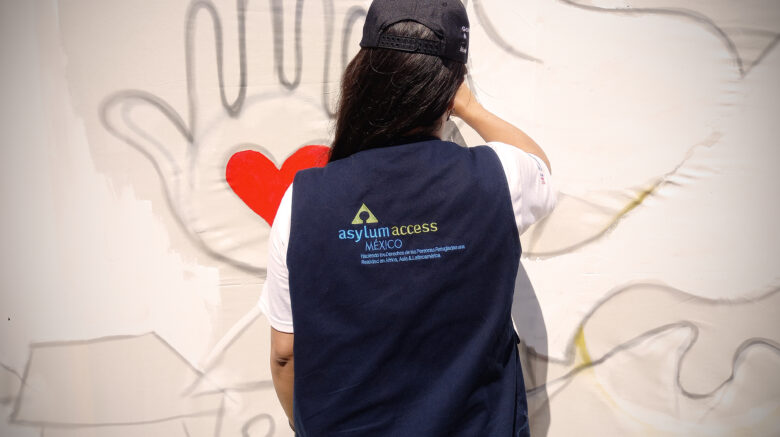Across the globe, the systems meant to protect people fleeing war, climate change, persecution, and violence are failing. The current humanitarian responses are outdated. They focus on short-term aid as opposed to sustainable solutions. They were built to serve the interests of states, donors, and other international actors rather than the needs of forcibly displaced communities. They deny forcibly displaced people from legal protection, access to livelihoods, basic human dignity, and often criminalize them for seeking safety. Yet amid this breakdown, refugee-led solutions are rising to rebuild systems that center justice, dignity, and refugee leadership. And Asylum Access is honored to stand alongside our refugee-led partners as they lead the way in reclaiming and reimagining the systems.
Here are 3 examples of what is broken in the global system—and how we’re building something better.
- Problem: Protection Systems Are Built ‘For’, Rather Than With, Refugees
Our Approach: Localized Protection Rooted in Proximity and Trust
In many countries, refugees lack legal status and are criminalized for seeking protection. This exclusion leaves them vulnerable to arrest, exploitation, and abuse. In Thailand, for example, the lack of legal recognition pushes refugees into the shadows. Too often, protection frameworks are imposed from the outside by the international institutions, missing the nuances of local context and lived experiences.These top-down approaches, without the lived experience knowledge, result in short-term interventions that don’t address structural barriers.
Asylum Access provides legal services that uphold human rights and challenge systems of exclusion. In Malaysia, our employment dispute program supports refugees who face wage theft and unsafe working conditions. In Mexico, our legal team prevents arbitrary detention and ensures access to services. Through Localized Protection, we ensure forcibly displaced people can access justice, rebuild their lives, and together with the host community, reshape the systems that affect them. In Malaysia, Mexico, and Thailand, our legal teams put refugee communities at the center of our work and challenge discriminatory laws, support refugee workers, and create community-led safety nets.
- Problem: Refugees Are Excluded from Decisions About Their Lives
Our Approach: Refugee Leadership and Equitable Partnerships
International responses often emphasize emergency aid over long-term integration. But for many refugees, returning home is not an option. That’s why sustainable livelihoods and community belonging must be prioritized.
Decisions made without refugees are often ineffective at best, and harmful at worst. At Asylum Access, we believe meaningful refugee participation is a right—not an afterthought. We advocate for this right through Equitable Partnerships, reimagining how international actors engage with refugee leaders. In Malaysia, our team works closely with refugee-led organizations to co-design legal and advocacy strategies. In Thailand, refugee leaders actively shape community outreach. And in Mexico, we’re building refugee inclusion into local ecosystems through initiatives like the Hospitality Route. We help families secure housing, healthcare, education, and fair work. Integration isn’t a moment—it’s a process. And it starts from the first day a person seeks protection.
- Problem: Refugee-Led Organizations (RLOs) Receive Less than 1% of Funding
Our Approach: Direct Funding for Local Leaders through RRLI
Despite being closest to the communities they serve, refugee-led organizations (RLOs) receive less than 1% of global humanitarian funding. This underfunding limits their ability to sustain services or scale impact.
As a founding member of the Resourcing Refugee Leadership Initiative (RRLI), Asylum Access is working to shift this. RRLI established a first-of-its-kind RLO-to-RLO fund, directing funding and resources to RLOs, ensuring they can lead responses with the legitimacy, lived experience, and local knowledge that international actors often lack.
Rebuilding the System
The global asylum system is broken—not because we lack resources, but because we’ve built a system that excludes the very people it’s meant to protect. This system fails because it treats displacement as a temporary emergency, not a long-term human reality. It centers international actors and short-term aid, rather than the leadership, knowledge, and resilience of displaced communities themselves. And most of all, it fails because it was never built with AND for refugees.
But change is not only possible, it is already happening. Across the world, refugee leaders and local advocates are building stronger, fairer systems from the ground up. And at Asylum Access, we are committed to walking alongside these leaders—not to speak for them, but to shift power to them. If this resonates with your work, reach out to us for collective action because transforming the system requires not only good intentions but also action. NOW.
At Asylum Access, we’re helping to build something different.
These solutions don’t just respond to the system’s failures—they transform them:
– Where the global system underfunds refugee-led groups, we deliver **direct investment and leadership development
– Where protection frameworks exclude refugee voices, we build **partnerships rooted in equity and shared decision-making**.
– Where laws criminalize displacement, we offer legal empowerment and community-driven advocacy
– And where the response is short-term and transactional, we support dignified, sustainable integration from day one
We are not waiting for institutions to catch up—we are moving forward with the solutions refugee communities are already creating. And we are inviting you to come with us.

